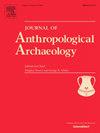Hunting, Herding, and diet breadth. A landscape based approach to niche shifting in subsistence economies (Gobi Desert)
IF 2.2
1区 社会学
Q1 ANTHROPOLOGY
引用次数: 0
Abstract
Diet is fundamental and closely interconnected with land-use, technology, and economy. When societies undergo major diet shifts, the entire human niche shifts, including all interrelated aspects of social organization. As such, larger patterns in social organization can inform us about diet in the absence of direct evidence. This study focuses specifically on patterns of land-use in the Gobi Desert of China and Mongolia, a place where direct evidence of diet is scanty due to the poor preservation of organics. The purpose is to explore diachronic changes in the spatial distribution of sites and variation in intensity of site use in order to explore proposed changes in subsistence economies. Here, a reorganization of technology, raw material use, and settlement that began in the early to middle Holocene (“Oasis 2”) supports the idea of diet breadth expansion between the Palaeolithic and Bronze Age. Strategies of land-use during all three periods are considered. The findings offer a foundation from which to build testable hypotheses about local land-use and subsistence, but also a model for exploring such transitions in other regions where direct evidence is scanty (e.g., forest landscapes, many arid regions and the very deep past).
狩猎、放牧和饮食广度。自给经济中基于景观的生态位转移方法(戈壁沙漠)
饮食是基础,与土地利用、技术和经济密切相关。当社会发生重大饮食变化时,整个人类的生存环境都会发生变化,包括社会组织中所有相互关联的方面。因此,在缺乏直接证据的情况下,较大的社会组织模式可以为我们提供有关饮食的信息。本研究特别关注中国和蒙古戈壁滩的土地利用模式,由于有机物保存不善,这里的饮食直接证据很少。研究的目的是探讨遗址空间分布的非同步变化和遗址使用强度的变化,以探索生存经济的拟议变化。在这里,始于全新世早中期("绿洲 2")的技术、原材料使用和定居的重组支持了旧石器时代和青铜时代之间饮食范围扩大的观点。研究考虑了这三个时期的土地使用策略。研究结果为建立有关当地土地利用和生计的可检验假设提供了基础,同时也为在直接证据稀少的其他地区(如森林景观、许多干旱地区和非常深的过去)探索这种过渡提供了模型。
本文章由计算机程序翻译,如有差异,请以英文原文为准。
求助全文
约1分钟内获得全文
求助全文
来源期刊

Journal of Anthropological Archaeology
Multiple-
CiteScore
4.00
自引率
11.10%
发文量
64
期刊介绍:
An innovative, international publication, the Journal of Anthropological Archaeology is devoted to the development of theory and, in a broad sense, methodology for the systematic and rigorous understanding of the organization, operation, and evolution of human societies. The discipline served by the journal is characterized by its goals and approach, not by geographical or temporal bounds. The data utilized or treated range from the earliest archaeological evidence for the emergence of human culture to historically documented societies and the contemporary observations of the ethnographer, ethnoarchaeologist, sociologist, or geographer. These subjects appear in the journal as examples of cultural organization, operation, and evolution, not as specific historical phenomena.
 求助内容:
求助内容: 应助结果提醒方式:
应助结果提醒方式:


